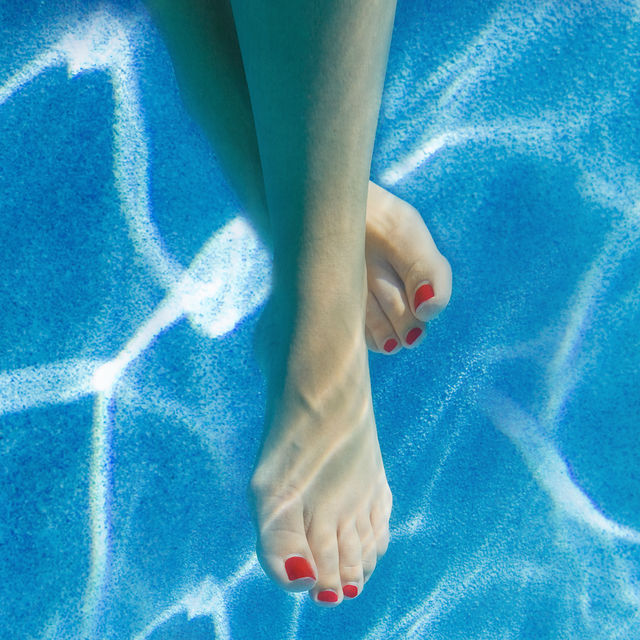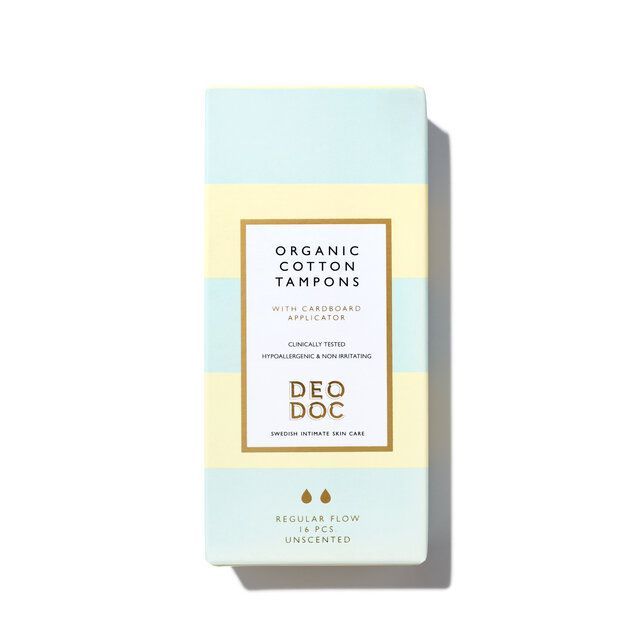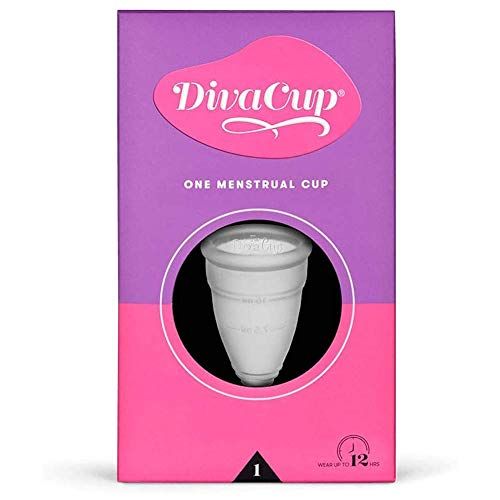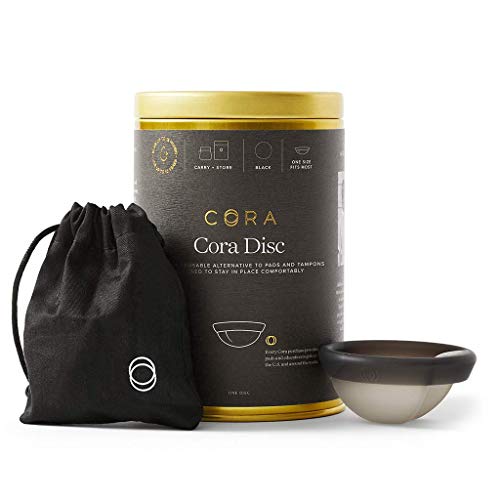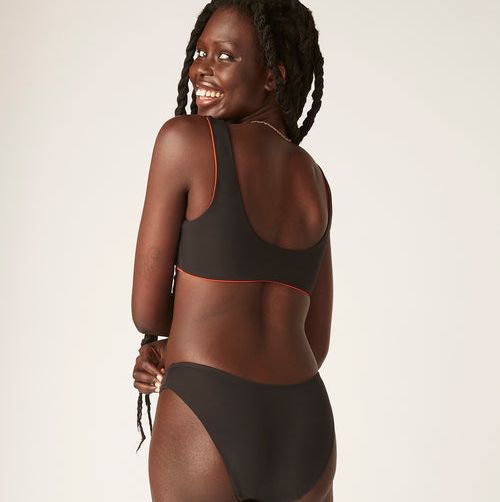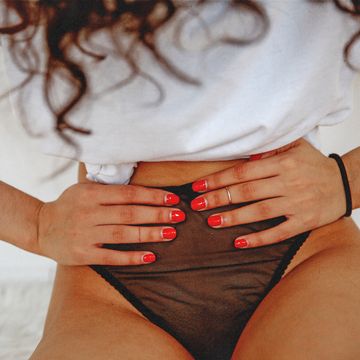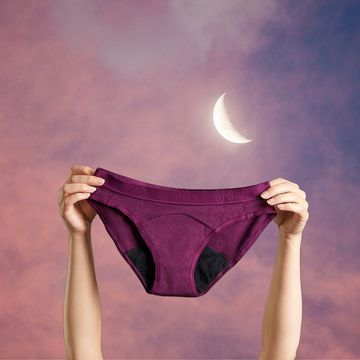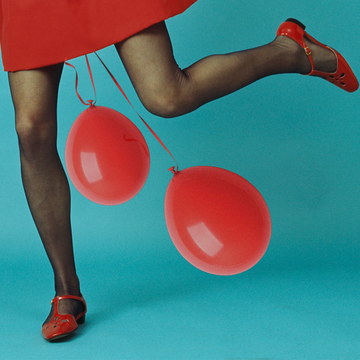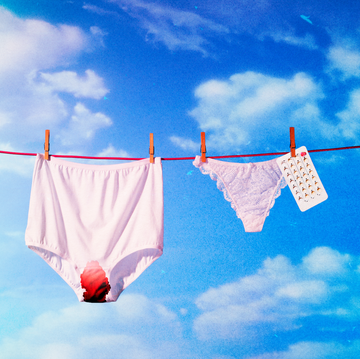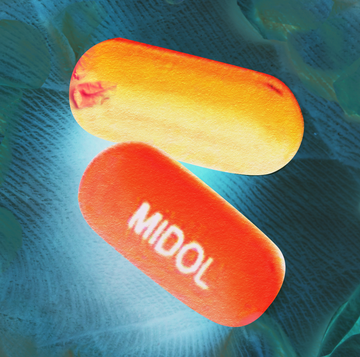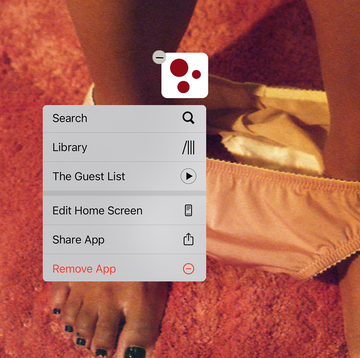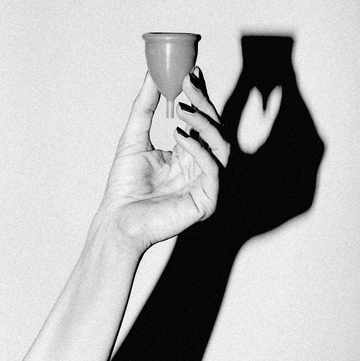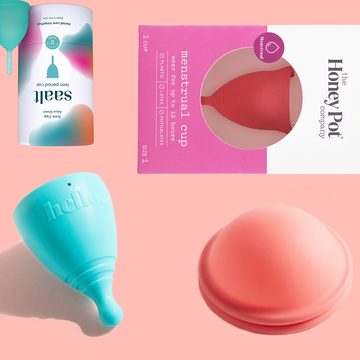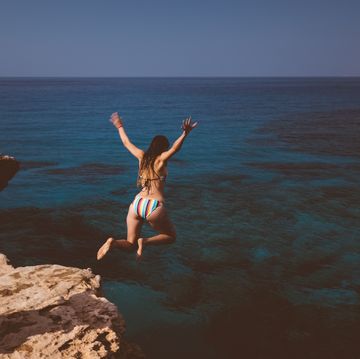Sorry if we’re about to give you flashbacks to your first middle school pool party...but with spring break underway and warm weather on the horizon, we’ve gotta discuss something. You know how when you hop into a pool or wade into the water at the beach during your period, if you’ve ever done it before, it kinda feels like the flow well, stops, almost as if you have a tampon in there? Come on, we can’t be the only ones.
So scientifically, is this a real thing: Does your period stop in water? Or is your period stopping just wishful thinking when you’re on a tropical vacay and don’t want to believe that you actually have it?
We chatted with a doctor who specializes in all things periods to find out what really goes on when you swim with your period, along with the answers to all your pressing questions. Like, do you need to wear a tampon when you swim? Can you just, ya know, free bleed without worrying about a shark attack? Are there swimsuits out there that you can wear specifically during your period to prevent leaks? Yeah, there’s a lot to unpack.
If you’re heading on a trip or to the beach, hopefully you do not get your period on the way...but if you do, you’ll be adequately prepared thanks to this. Read to understand everything about the proper pool party period protection, or hitting the beach while bleeding—here’s your guide to how to swim on your period.
Wait, so why does it feel like your period stops in water?
First of all, let's get this out of the way: You can absolutely safely swim while on your period—there's nothing to feel shame about. "In fact, exercising and moving your body while menstruating can actually help with cramps and period pain," says Natasha Ramsey, MD, MPH, an adolescent medicine physician specializing in period management and advisory board member at the cycle tracking app Orchyd.
Next up, Dr. Ramsey wants to address two myths that are floating (ha) around out there: that your period attracts sharks, and that your period magically stops underwater. Don't even listen to the shark thing, even if you are swimming in the ocean, and note that your period doesn’t fully stop in water, even if it feels that way. "Your body is still releasing menstrual blood while you are underwater. However, the pressure while your body is underwater (aka buoyancy) slows the flow," explains Dr. Ramsey. So you're not going to bleed as much while you're taking a dip, but if you're on a heavy flow day or have a heavier period in general, you could end up with some leakage out of your swimsuit.
Can you swim on your period without a tampon?
You have our full permission to free bleed; it’s not un-hygienic, according to Dr. Ramsey. The water you're swimming in will dilute the blood, so it won't look like a trail of it following you. But if you’re worried about leaks, especially if you’re at the beginning of your cycle (we all know that day one and two flow) and that feels too risky for you, there are options.
Just note that whatever form of period protection you choose, don’t wear a pad or liner in the pool or ocean—in that case you’re probably better with nothing at all, because it will fill with water and won't actually be able to absorb your period, Dr. Ramsey says. You can pick just about any other form of disposable or reusable menstrual product, though!
What are the best period products for swimming?
- Low-absorbency tampons. You'll have to change tampons every six to eight hours anyway, whether you're swimming or not, says Dr. Ramsey. You might want to go with a tampon geared toward lighter flow while you're swimming since your flow won't be as heavy, generally speaking, and it'll be easier to remove. "While you're swimming, tampons can absorb some of the water and other chemicals, so using a low-absorbency tampon and changing it more frequently helps reduce the risk of any irritation or discomfort," Dr. Ramsey points out.
- Menstrual cups. A menstrual cup can stay in for 12 hours and can hold that many hours worth of blood, so you can feel super secure during a pool party. It could end up being more comfortable to remove, because it collects instead of absorbs the blood (and that way won't absorb any water while you swim), says Dr. Ramsey.
- Menstrual discs. Discs are sort of the same deal as cups in that they're good for 12 hours and will collect, not absorb, your period. They're more shallow, and are engineered so you can keep them in during sex (if you happen to have a hot tub hookup, you're welcome).
- Period swimwear. Your other option is period-friendly swimwear, says Dr. Ramsey. It's designed to be absorbent and help ya avoid leaks—most period swimwear bottoms hold about two tampons' worth of blood, which should hopefully be enough to last you through a nice swim. If you're a period undie stan, this might be your go-to, especially if you're not into wearing tampons, cups, or discs.
Whatever you use, make sure you change it frequently enough.
You don’t wanna hang around in a wet bathing suit, whether it’s a regular or period-friendly one, so you don't invite a BV infection (or bacterial vaginosis, an imbalance of the bacteria in your vagina that can cause uncomfy burning and itching) or yeast infection to the pool party. "Remember that your vagina is full of bacteria and yeast that live in perfect harmony," says Dr. Ramsey. "Yeast loves warm and moist environments [so does bacteria], and wearing a wet swimsuit for too long can cause yeast to overgrow and lead to a yeast infection."
And then you're adding period blood and products to the mix, so that can add to infection risk, adds Dr. Ramsey. Of course you also shouldn't leave tampons, menstrual cups or menstrual discs in for too long anyway (eight hours is generally the best cutoff), but the risk of that is only about one in 100,000, according to the University of Washington School of Medicine.
The bottom line? "Be sure to change your period products regularly, dry off after taking a dip, and change into dry clothes and cotton underwear as soon as possible," says Dr. Ramsey. So whether you’re hitting the pool or beach, just be mindful to do a quick bathroom run before you take a nap face down on your towel.

